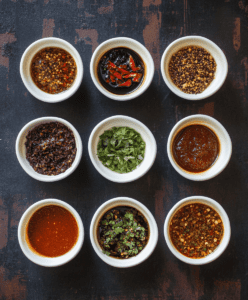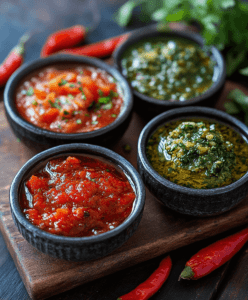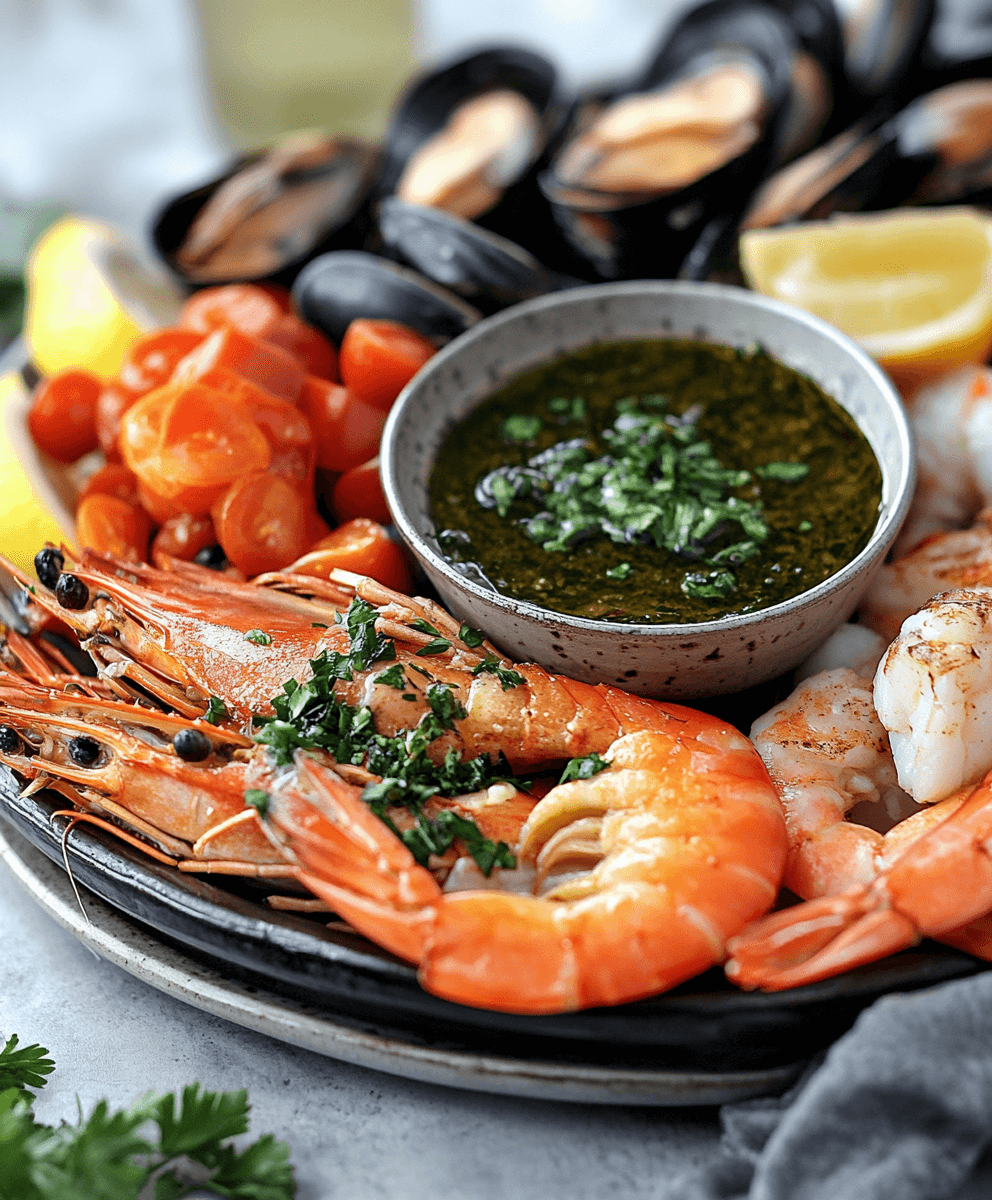When it comes to seafood, one of the most common questions is: “What are the best sauces for seafood?” The best sauces for seafood are essential for enhancing the natural flavors of shrimp, lobster, salmon, and other seafood. Whether you’re grilling, frying, or baking, using the best sauces for seafood can transform your dish and bring out its unique taste. The right seafood sauce can complement the texture and richness of the seafood, making it a key part of your meal. Finding the best sauces for seafood is not just about adding flavor; it’s about pairing the right sauce with the right dish. With so many options, discovering the best sauces for seafood will ensure a truly elevated dining experience.
What Sauce Is Best for Seafood?

The art of pairing seafood with sauces has been around for centuries. Sauces were originally used to mask the flavor of less-than-fresh seafood, but today they are crafted to enhance and complement the natural taste of fresh, high-quality ingredients. A well-chosen sauce can balance the richness of lobster, highlight the sweetness of shrimp, or add a tangy kick to fried fish.
Why Sauces Matter
- Flavor Enhancement: Adds layers of flavor to seafood.
- Moisture: Prevents seafood from feeling dry, especially when grilled or baked.
- Presentation: A beautifully drizzled sauce can make a dish visually appealing.
Best Sauces for Seafood: Top Pairings for Shellfish, Finfish, and Mollusks
Different types of seafood require unique sauces to complement their distinct flavors and textures.
Shellfish
Shellfish like shrimp, crab, lobster, and clams have a natural sweetness that pairs well with buttery or tangy sauces. Examples include:
- Shrimp: Cocktail sauce, garlic butter, or spicy remoulade.
- Crab: Lemon butter, Old Bay aioli, or mustard sauce.
- Lobster: Classic drawn butter, béarnaise, or creamy bisque sauce.
Finfish
Finfish such as salmon, cod, and halibut vary in flavor intensity. They work well with a variety of sauces:
- Salmon: Dill yogurt sauce, honey mustard glaze, or teriyaki.
- Cod: Lemon herb sauce, white wine butter sauce, or romesco.
- Halibut: Citrus vinaigrette, creamy basil pesto, or miso glaze.
Mollusks
Mollusks like squid, octopus, and scallops have tender textures and mild flavors that benefit from bold sauces:
- Scallops: Brown butter sage, citrus beurre blanc, or chimichurri.
- Squid: Marinara, garlic aioli, or soy-based dips.
- Octopus: Harissa, tahini, or paprika vinaigrette.
Classic Seafood Sauces: The Best Sauces for Shrimp, Lobster, and More
Classic sauces like tartar, cocktail, and lemon butter are frequently mentioned when discussing “What sauce is best for seafood?” These timeless options add depth to fried fish, shellfish, and grilled seafood.
Tartar Sauce
This creamy and tangy sauce combines mayonnaise, chopped pickles, capers, and fresh herbs. It’s the perfect partner for fried seafood like fish and chips, crab cakes, and calamari.
Cocktail Sauce
A zesty mixture of ketchup, horseradish, lemon juice, and Worcestershire sauce, cocktail sauce is a must-have for shrimp and shellfish platters.
Lemon Butter Sauce
Simple yet sophisticated, lemon butter sauce is made with melted butter, fresh lemon juice, and parsley. It’s a classic pairing for lobster, crab, and delicate white fish.
Regional Seafood Sauces Around the World
Different cultures bring unique flavors to the table, offering diverse sauces that highlight local ingredients and traditions.
French Sauces
- Hollandaise: A rich, buttery sauce with a hint of lemon, perfect for poached fish.
- Béarnaise: Similar to hollandaise but with tarragon and vinegar, ideal for lobster or grilled fish.
Asian Sauces
- Soy-Ginger Glaze: A blend of soy sauce, ginger, garlic, and a touch of honey works well with seared tuna or steamed fish.
- Thai Sweet Chili Sauce: This sweet and spicy sauce pairs beautifully with fried shrimp and squid.
Mediterranean Sauces
- Aioli: A garlicky mayonnaise that adds depth to grilled octopus and seafood platters.
- Romesco: A Spanish sauce made with roasted peppers, nuts, and olive oil, great for grilled fish or shellfish.
Caribbean Sauces
- Mango Salsa: A tropical mix of diced mango, red onion, lime juice, and chili peppers, perfect for jerk-seasoned fish.
- Coconut Curry: A creamy, spicy sauce that enhances shrimp and scallops.
Bold and Spicy Sauces for Seafood Lovers: Perfect Sauces for Grilled Fish
Rich, creamy sauces bring indulgence to seafood dishes, making them perfect for special occasions.
Dill Sauce
This yogurt-based sauce with dill, lemon juice, and garlic adds a refreshing tang to baked salmon and trout.
Mustard Cream Sauce
Combining Dijon mustard, heavy cream, and white wine, this sauce complements the smoky flavors of grilled fish.
Alfredo Sauce
Although typically paired with pasta, Alfredo’s creamy, cheesy profile is an excellent match for lobster and crab.
Spicy Sauces for Adventurous Palates
For those who love a little heat, spicy sauces can add excitement to your seafood dishes.
Cajun Sauce
This bold sauce combines paprika, cayenne, garlic, and onion powder. It’s perfect for blackened fish or shrimp.
Harissa
A North African chili paste with smoky, spicy notes, harissa is excellent with grilled octopus or squid.
Sriracha Mayo
A modern favorite, this blend of Sriracha and mayonnaise works wonderfully as a dipping sauce for fried seafood or a topping for sushi rolls.
Light and Healthy Sauces for Seafood: Best Options for Fresh Fish Dishes
Healthy sauces allow the natural flavors of seafood to shine while keeping dishes light.
Citrus Vinaigrette
A mix of orange or lime juice, olive oil, and honey, this sauce adds brightness to seafood salads or ceviche.
Herb-Yogurt Dressing
A creamy yet light option made with Greek yogurt, parsley, and lemon zest, perfect for grilled fish.
Tomato Salsa
Fresh tomatoes, onions, cilantro, and lime juice create a vibrant topping for grilled or baked fish.
Homemade vs. Store-Bought: Choosing the Best Sauces for Seafood
The choice between homemade and store-bought sauces often depends on the balance between convenience and customization. Store-bought sauces are quick and easy, saving time in the kitchen, but they may lack the personal touch or specific flavor adjustments that homemade versions can offer. Homemade sauces, on the other hand, allow you to tailor ingredients to your taste, dietary needs, or the dish you’re preparing, giving you greater control over the final flavor and quality. Ultimately, the decision comes down to your priorities and the time available for preparation.
Homemade Sauces
- Pros: Fresh, customizable, and preservative-free.
- Cons: Time-intensive and requires fresh ingredients.
Store-Bought Sauces
- Pros: Convenient and consistent flavor.
- Cons: Often contain preservatives and artificial ingredients.
Tips for Store-Bought Sauces:
- Look for natural ingredients.
- Choose flavors that match your seafood.
- Check for dietary certifications (e.g., gluten-free, vegan).
Pairing Wine and Beverages with Sauces
Pairing beverages with seafood and sauces enhances the dining experience.
- White Wines: Sauvignon Blanc complements citrusy or herbal sauces, while Chardonnay pairs with creamy sauces.
- Sparkling Wines: Champagne or Prosecco cuts through the richness of fried or buttery dishes.
- Beer: Light beers like pilsners or wheat beers work well with traditional seafood sauces.
Techniques for Making the Perfect Seafood Sauce
Perfecting seafood sauces requires attention to detail and technique.
Balancing Flavors
Combine acidity (lemon or vinegar), sweetness (honey or sugar), and umami (soy sauce or miso) for a well-rounded taste.
Emulsification
Whisking oil into a liquid base like lemon juice ensures a smooth, cohesive sauce.
Fresh Ingredients
Use fresh herbs, garlic, and citrus for vibrant flavors.
Vegan and Dairy-Free Alternatives
For plant-based and dairy-sensitive diners, there are numerous alternatives to traditional seafood sauces that deliver rich and delicious flavors. Options like coconut milk-based sauces, cashew cream blends, or tangy aquafaba aioli provide excellent substitutes without compromising taste. Herb-forward sauces like chimichurri or dairy-free pesto also pair beautifully with seafood, offering fresh and vibrant flavors. These alternatives ensure everyone can enjoy a flavorful and satisfying meal, regardless of dietary preferences or restrictions.
Cashew Cream
Blended cashews combined with water, garlic, and lemon juice create a smooth and creamy dairy-free base for sauces. The natural richness of cashews gives the mixture a velvety texture, while the garlic and lemon juice add depth and brightness to the flavor. This versatile base can be customized with additional herbs and spices to suit a variety of dishes, making it an excellent option for those seeking plant-based or dairy-free alternatives.
Plant-Based Aioli
Aquafaba, the liquid from canned or cooked chickpeas, is an excellent substitute for eggs in creating a vegan-friendly garlic aioli. Its unique properties allow it to emulsify with oil, producing a creamy and smooth texture similar to traditional aioli. Infused with garlic, this plant-based alternative delivers all the flavor and richness you expect, making it a perfect accompaniment for various dishes while catering to vegan diets.
Coconut Milk Sauces
Coconut milk adds a creamy richness to dishes and complements the bold flavors of spicy seafood beautifully. Its natural sweetness helps balance the heat from spices, creating a harmonious and flavorful combination. Whether used in curries, soups, or sauces, coconut milk enhances the dish’s texture and depth, making it a perfect ingredient for spicy seafood recipes.
Gluten-Free and Allergy-Friendly Sauces
- Use cornstarch instead of flour as a thickener.
- Avoid nuts in sauces like pesto.
- Check store-bought options for allergy-friendly certifications.
Common Mistakes When Choosing or Making Sauces
Avoid these pitfalls to ensure your sauce complements your seafood:
- Overpowering Flavors: The sauce should enhance, not mask, the seafood.
- Clashing Textures: Match the sauce’s consistency to the dish’s texture.
- Overlooking Cooking Methods: Grilled seafood pairs better with bold sauces, while poached seafood works with light, delicate sauces.

Six FAQs About Seafood Sauces
What is the best sauce for shrimp?
Yes, these sauces pair especially well with grilled options such as shrimp or swordfish. Their bold flavors complement the smoky, charred notes from grilling, enhancing the natural taste of the seafood. Whether it’s a creamy aioli, zesty lemon butter, or vibrant chimichurri, these accompaniments bring out the best in grilled dishes, making them a perfect match for shrimp, swordfish, and other seafood options.
Can barbecue sauce work with seafood?
Yes, these sauces pair especially well with grilled options such as shrimp or swordfish. Their bold flavors complement the smoky, charred notes from grilling, enhancing the natural taste of the seafood. Whether it’s a creamy aioli, zesty lemon butter, or vibrant chimichurri, these accompaniments bring out the best in grilled dishes, making them a perfect match for shrimp, swordfish, and other seafood options.
Which sauces are keto-friendly?
Aioli, lemon butter, and chimichurri are all excellent keto-friendly options that add rich flavor to your meals while keeping carbohydrate content low. Aioli, with its creamy, garlic-infused base, is perfect for enhancing grilled meats or vegetables. Lemon butter offers a zesty, indulgent touch that pairs wonderfully with seafood and poultry. Chimichurri, made from fresh herbs, olive oil, and garlic, brings a vibrant and tangy element to any dish. These versatile sauces not only align with a keto lifestyle but also elevate the taste and presentation of your meals.
How long do homemade seafood sauces last?
Store them in an airtight container in the refrigerator to keep them fresh for up to three days. Using an airtight container helps prevent exposure to air, which can cause the food to dry out or absorb unwanted odors from other items in the refrigerator. This method ensures that the texture, flavor, and overall quality are maintained for as long as possible. For best results, always allow the food to cool completely before sealing it in the container, as this helps prevent condensation and preserves its freshness even longer.
What sauce pairs well with salmon?
A dill yogurt sauce or a honey-mustard glaze pairs beautifully with salmon, enhancing its rich, natural flavors. The dill yogurt sauce offers a refreshing, creamy balance with its tangy and herbaceous notes, while the honey-mustard glaze adds a delightful combination of sweetness and tang. Both options complement the salmon’s texture and taste, making it a versatile dish for various occasions.
Are sugar-free sauces available?
Many homemade options, such as vinaigrettes and herb-based sauces, are naturally free from added sugar, making them a healthier choice for enhancing your dishes. By focusing on fresh, wholesome ingredients like olive oil, vinegar, herbs, and spices, you can create flavorful dressings and sauces without the need for sweeteners. These options are ideal for those looking to reduce their sugar intake while still enjoying delicious, well-seasoned meals.
Conclusion
The best sauce for seafood depends on the dish, the type of seafood, and personal taste. Whether you prefer the tangy classic cocktail sauce, the creamy indulgence of hollandaise, or the fiery kick of Cajun spice, there’s a perfect pairing for every seafood lover. Experiment with different combinations, explore regional flavors, and don’t shy away from making sauces at home. The possibilities are endless—and delicious.
Related article:
What’s in Zatarain’s Seafood Boil Seasoning?

